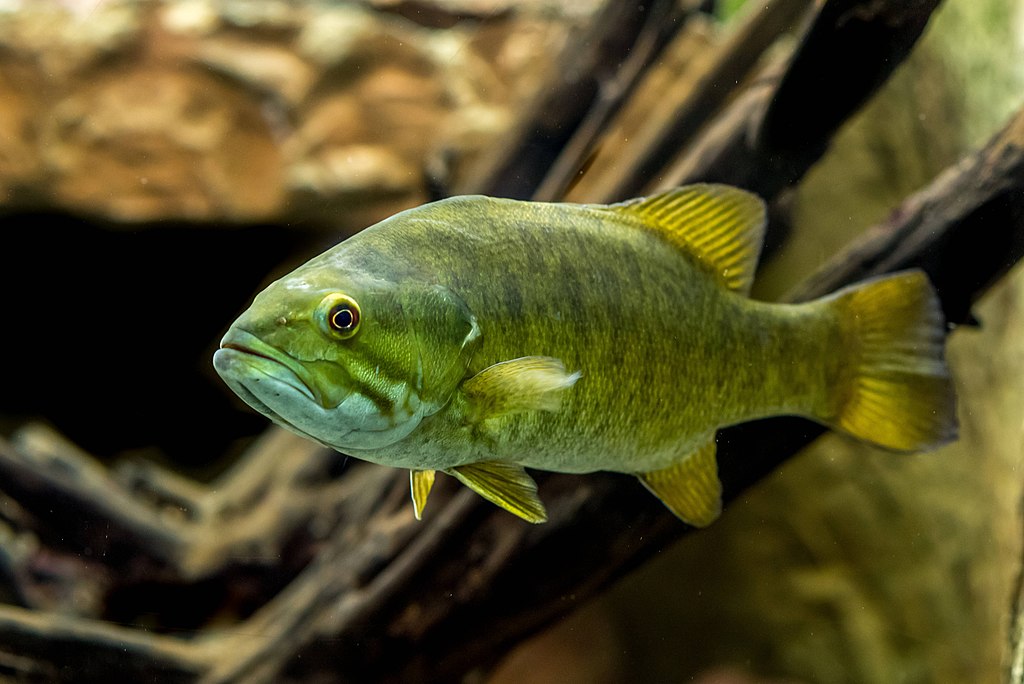
Smallmouth Bass
Scientific Name: Micropterus dolomieu
Also known as: Bronzeback, Smallie, Brown Bass, Rocky Mountain Bass, Smallmouth
General Description
The smallmouth bass is a popular sport fish known for its aggressive fighting spirit and strong, muscular build. It is a predatory fish with a streamlined body, typically displaying a bronze or brownish-green color with dark vertical bars running down its sides. Smallmouths typically range from 12 to 20 inches in length, though trophy-sized individuals can exceed 22 inches. Their size, speed, and acrobatic jumps when hooked make them one of the most challenging and rewarding fish to catch.
Smallmouth bass have a relatively broad head with a large mouth, often extending past the eyes when closed, which is an indication of their predatory nature. They are equipped with sharp, needle-like teeth to catch and hold onto their prey. Smallmouth bass are known for their endurance and stamina, providing a thrilling experience for anglers as they fight against the line.
These fish are often found in rocky, clear waters and are a favorite among anglers who enjoy fishing in both lakes and rivers. With their keen sense of sight and quick reflexes, smallmouth bass are excellent hunters, preying on a variety of smaller fish and invertebrates, making them a prized catch for sport fishing enthusiasts.
Where to Find Them
Smallmouth bass thrive in a variety of freshwater environments, but they are most commonly found in clear, cool rivers and lakes with rocky substrates and strong currents. They are native to eastern North America but have been introduced to many regions across the United States and Canada. Smallmouths prefer areas with deep, rocky bottoms, submerged boulders, and ledges, which provide shelter and hunting opportunities.
In lakes, smallmouth bass are usually found in deeper, cooler waters, especially during the summer months when the water temperature rises. During spring and fall, they may move into shallower areas, including rocky shorelines, where they actively feed and spawn. River populations are typically found in fast-moving waters, especially around rapids and submerged rocks, which provide both cover and hunting grounds.
Some of the best places to find smallmouth bass include the Great Lakes, the St. Lawrence River, and rivers like the Mississippi, the Susquehanna, and the Ohio. Many man-made reservoirs also support thriving smallmouth bass populations, thanks to their clear waters and healthy ecosystems. Anglers can expect to find them in these habitats year-round, though their activity levels will vary based on water temperature and the availability of food.
Best Baits
Live Bait Options
- Minnows (shiners, chubs)
- Crawfish
- Nightcrawlers
- Small sunfish
- Worms (especially large ones)
Artificial Bait Options
- Jerkbaits
- Crankbaits
- Soft plastic worms and grubs
- Spinnerbaits
- Topwater lures (such as poppers and frogs)
Best Fishing Methods
Smallmouth bass are known for their powerful and acrobatic fight when hooked, making them one of the most exciting fish to target for sport anglers. The most effective methods for fishing for smallmouths involve techniques that mimic their natural prey, such as smaller fish and invertebrates. Anglers commonly use both trolling and casting techniques depending on the habitat and fishing conditions.
Casting with soft plastics such as worms or grubs is highly effective for smallmouth bass, particularly when working them slowly along the bottom or through rocky structures. Crankbaits, especially those that mimic baitfish, are another excellent choice for attracting smallmouth bass, as these fish are aggressive predators that will chase after fast-moving baits. Jerkbaits are particularly effective during the colder months when smallmouths are less active but still feed aggressively.
Topwater fishing is also popular, especially during the warmer months when smallmouth bass are more active and feeding near the surface. Topwater lures, such as poppers or frogs, can entice explosive strikes from smallmouths during dawn or dusk when they are most active.
When fishing in rivers, particularly in faster-moving waters, using spinnerbaits or crankbaits to cover larger areas can be effective. Smallmouth bass are often found near rocky ledges, submerged logs, and other structure that provide cover. Anglers should focus their efforts on these areas and fish slowly through them to increase the chances of a strike.
Given their aggressive nature and sharp eyesight, smallmouth bass often hit baits hard, making them an exciting fish to hook. The key to success is using a variety of lures and techniques and being patient, as smallmouth bass can be unpredictable in their feeding habits.
Summary
Fishing for smallmouth bass offers a thrilling challenge for anglers of all skill levels, thanks to the species’ strength, speed, and acrobatic fight. These fish are widely distributed across North America, inhabiting clear, rocky lakes and rivers where they prey on smaller fish and invertebrates. With their sharp eyesight and aggressive feeding habits, smallmouth bass are a favorite among sport anglers who are seeking a prize catch.
The best fishing techniques for smallmouths involve using a variety of baits that mimic their natural prey. Live baits such as minnows, crawfish, and nightcrawlers are effective, while artificial lures like jerkbaits, crankbaits, and topwater lures can entice strikes, particularly during active feeding periods. Fishing methods include both trolling and casting, with a focus on areas near submerged rocks, ledges, and structures that offer the bass cover while hunting.
Smallmouth bass are known for their strength and stamina, providing anglers with a truly memorable fishing experience. They can be found year-round, though fishing success often depends on water temperature and seasonal movement patterns. Whether in a lake, river, or reservoir, fishing for smallmouth bass is a rewarding pursuit, with the potential for an exciting and challenging catch.


